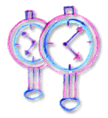POTENTIAL ESTIMATION STUDIES
Estimation of demand is one of the most frequently occurring objectives among studies on Petroleum. Some of the methods used for the estimation of potential are,
Supply Route
A fairly accurate estimate of domestic demand for an industrial product can be obtained by calculating the total industry production and adjusting this figure for imports and exports. This is possible given the oligopolistic nature of supply for most industrial products.
Demand = Total Production + Imports -Exports
Standard Norms of Consumption Approach

Demand can also be estimated by determining the standard norms of consumption of a product in a typical industry for each of the end user segments. Given the total industry production of that particular product, the demand can be estimated as follows :
Demand = iniPi
Where,
ni = Consumption norm is i'th end use segment
Pi = Total production in i'th end use segment
i = No. of end use industry segments
To give a simplified example, the demand for any product used as a fuel in an industry can be estimated as follows:
The norms of consumption of the product under study is determined from a sample of units. Now, given the total production of end products in India coupled with factors such rate of industry growth, imports/exports, alternatives and industry trends the potential can be calculated using the above formula.
CONCEPT TEST STUDIES
Petroleum products can have a wide range of applications and given the changing needs of end-consumers, it is imperative to constantly innovate and bring forth new products. To this end, IMRB has conducted studies to ascertain need gaps that exists in the consumer’s mind and also expectations. Based on these , certain ideas are conceptualised and the same are tested to assess the acceptability of these ideas and refine them further. This is an iterative process in any new product development phase, wherein the idea (i.e. the concept) is tested again to ensure that it matches the expectation of the end-consumer. Once the concept gains acceptance, the concept is put forth in the form of a product and introduced in the market.
PRODUCT ACCEPTABILITY AND SUBSTITUTABILITY STUDIES
![]() Once the concept is put forth in the form of a product, it becomes very pertinent to know their acceptability against established materials/products. IMRB has undertaken several market studies to establish whether the new products would find acceptance and substitute established materials/products and also identify any weaknesses (dislikes) and potential strong points.
Once the concept is put forth in the form of a product, it becomes very pertinent to know their acceptability against established materials/products. IMRB has undertaken several market studies to establish whether the new products would find acceptance and substitute established materials/products and also identify any weaknesses (dislikes) and potential strong points.
CUSTOMER SATISFACTION STUDIES FOR CHEMICALS
IMRB has carried out studies for clients to determine the level of satisfaction as expressed by their customers with regard to their products and services. Customers satisfaction involves ascertaining the perception of customers regarding the products and services offered by the client in terms of factors like product quality, delivery, flexibility of manufacture to sudden changes in requirement and delivery, commercial terms etc.
PRICING STUDIES
Studies on pricing are carried out for existing and new products. We conduct research into aspects such as ideal price, the ready to pay price as well as the sensitivity and elasticity of potential/demand to price. We have also conducted research to ascertain the utility of price vis-à-vis the product features at hand and ascertain the trade-off that a consumer makes on the price vis-à-vis the features on offer, using the conjoint technique. This type of study not only helps in ascertaining the value attached to product features but is also useful in designing the right type of product, which matches consumer expectations and the desired price.
PACKAGING STUDIES
Packaging studies, too, are carried out for existing and new products. We have conducted research to look in to perceived role of packaging in the brand purchase process, acceptability of packaging options, the desired features, advantages and disadvantages.
TRADE STUDIES
Trade studies are generally conducted to get an understanding of the trade practices prevalent in any particular product market in terms of nature of traders, volume handled, customers, payment terms etc.
STUDIES ON CORPORATE AND BRAND COMMUNICATION
![]()
In today’s competitive world, it is very essential for any company to be in touch with the end-consumer not only detailing the company’s products and its benefits (and hence building brand value) but also adopt a long-term approach to delineate to the consumer what the company is all about, services provides, its activities - all of which goes into not only creating a high salience but also convert him to a long-standing loyal consumer of one’s products. We conduct research to identify and assess the effectiveness of corporate and brand communication. This type of research typically starts with assessing positioning platforms (for new as well as existing products) and then conceptualising these into an communication strategy, which in turn gives rise to the message to be communicated. These are then tested out to assess effectiveness, before being put in the various media/forums. Once the communication into the various media, we conduct research studies to assess its effectiveness (on salience and perceptions) vis-à-vis competition.
HABITS AND PRACTICES STUDIES
Given the fact that any market-driven company has to be in touch with the end-consumers, it is pertinent to understand these end-consumers from time-to-time. We conduct studies to assess usage behaviour of end-consumers vis-à-vis the category and brand offerings. This information is useful in not only understanding the manner in which a product offerings are used but also ascertain the influences/role of a host of variables in the usage of a product, which further, gives rise to any unmet needs and expectations. These are studies are typically done in conjunction with an attitude section to understand the lifestyle and profile the consumer better, for any future communication.
MEDIA HABITS STUDY
 Given the need to keep in close touch with then end-consumer, it is pertinent to ascertain the media consumption habits of end-consumers (in the changing times) so as to communicate them in an effective manner. Towards this end, IMRB conducts research studies which ascertains the media consumption habits from time-to-time.
Given the need to keep in close touch with then end-consumer, it is pertinent to ascertain the media consumption habits of end-consumers (in the changing times) so as to communicate them in an effective manner. Towards this end, IMRB conducts research studies which ascertains the media consumption habits from time-to-time.
NAMING STUDY
Naming studies are typically done when the product is formally ready to be introduced into the market and/or when an existing product is re-launched. We conduct research into such aspects as acceptability of names vis-à-vis local connotations, sync with local culture and the brand benefits, ease of pronunciation, etc.
Click here for some related studies